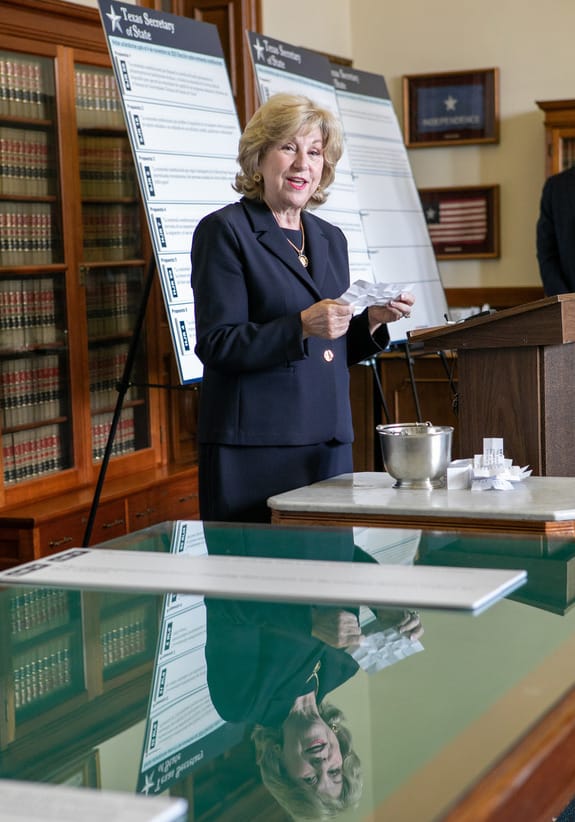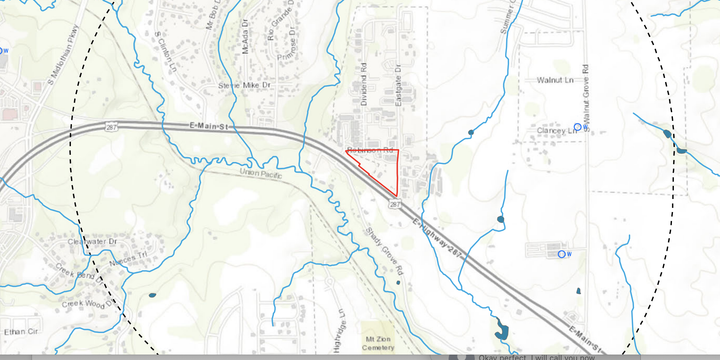Proposed constitutional amendments include several relating to property tax relief

AUSTIN — There will be 17 proposed amendments to the Texas Constitution on the Nov. 4 general election ballot. They represent the joint resolutions passed by a two-thirds vote in both the House and Senate during the recently concluded 89th Legislature.
Earlier this week, Texas Secretary of State Jane Nelson drew the ballot order, saying, “Texas lawmakers have proposed 17 amendments to the state constitution, and now Texans will have the opportunity to weigh in on each amendment. This is an opportunity to make your voice heard about the governing document of our state.”

Ten of the measures originated in the Senate, while seven started in the House. Several of the measures relate to property tax relief, including propositions 5, 7, 9, 10, 11, 13, and 17.
Below are the propositions and their captions that will appear on the ballot. In The Know Ellis has excerpted information (typically from each measure’s House Research Organization report) to provide some additional context. For more detailed information, click the joint resolution/number to be found via the legislature’s website, Texas Legislature Online.
• Proposition 1 (SJR 59) “The constitutional amendment providing for the creation of the permanent technical institution infrastructure fund and the available workforce education fund to support the capital needs of educational programs offered by the Texas State Technical College System.” (The author was Sen. Brian Birdwell, R-Granbury, whose district includes the western part of Ellis County).
The measure establishes a funding mechanism that will be dedicated to the TSTC system, providing it with stable and long-term funding for capital infrastructure needs.
• Proposition 2 (SJR 18) “The constitutional amendment prohibiting the imposition of a tax on the realized or unrealized capital gains of an individual, family, estate, or trust.” (Birdwell was a co-author).
Although Texas has a constitutional amendment preventing the establishment of an income tax, concerns have arisen about a capital gains tax being passed by the legislature.
• Proposition 3 (SJR 5) “The constitutional amendment requiring the denial of bail under certain circumstances to persons accused of certain offenses punishable as a felony.” (Birdwell was a co-author; state Sen. Bob Hall, R-Rockwall, whose district includes the eastern portion of Ellis County, was also a co-author).
The measure would expand the number of options available to officials setting bail, including the ability to deny bail under “certain extraordinary circumstances.” Critics say this would undermine “the presumption of innocence.”
• Proposition 4 (HJR 7) “The constitutional amendment to dedicate a portion of the revenue derived from state sales and use taxes to the Texas Water Fund and to provide for the allocation and use of that revenue.” (Birdwell was a co-sponsor).
If passed, the amendment instructs the state comptroller to deposit up to $1 billion each year into the Texas Water Fund to go toward addressing Texas’ water needs. Critics say the amendment doesn’t go far enough in securing the water needed.
• Proposition 5 (HJR 99) “The constitutional amendment authorizing the legislature to exempt from ad valorem taxation tangible personal property consisting of animal feed held by the owner of the property for sale at retail.”
Under this amendment, animal feed sellers would no longer be taxed on their inventory, a cost that was likely passed onto farmers and consumers. Animal feed itself is not taxed when sold. The amendment’s opponents say it provides an unfair tax benefit to one sector.
• Proposition 6 (HJR 4) “The constitutional amendment prohibiting the legislature from enacting a law imposing an occupation tax on certain entities that enter into transactions conveying securities or imposing a tax on certain securities transactions.”
The amendment would prohibit taxes on securities transactions and occupations that proponents believe have the potential to negatively impact the performance of the upcoming Texas Stock Exchange. Critics say this removes a potential revenue-generating option in the event of an economic downturn.
• Proposition 7 (HJR 133) “The constitutional amendment authorizing the legislature to provide for an exemption from ad valorem taxation of all or part of the market value of the residence homestead of the surviving spouse of a veteran who died as a result of a condition or disease that is presumed under federal law to have been service-connected.”
The amendment serves to correct a discrepancy and is in response to the passage of the PACT Act, which expanded health benefits for veterans. Critics say, however, that it passes tax burdens onto others.
• Proposition 8 (HJR 2) “The constitutional amendment to prohibit the legislature from imposing death taxes applicable to a decedent’s property or the transfer of an estate, inheritance, legacy, succession, or gift.”
Supporters say the measure would help to ensure future legislatures do not establish a “death tax,” with critics saying the state should retain that option, writing that “[c]onstitutional amendments should be reserved for the most critical matters concerning the state.”
• Proposition 9 (HJR 1) “The constitutional amendment to authorize the legislature to exempt from ad valorem taxation a portion of the market value of tangible personal property a person owns that is held or used for the production of income.” (Birdwell was a co-sponsor).
The amendment increases the exemption for business personal property to $250,000. Proponents point to decreased administrative and financial burdens for businesses, while critics say the measure could result in taxing entities passing their loss of revenue onto homeowners.
• Proposition 10 (SJR 84) “The constitutional amendment to authorize the legislature to provide for a temporary exemption from ad valorem taxation of the appraised value of an improvement to a residence homestead that is completely destroyed by a fire.”
The measure would allow for a temporary exemption, with the legislature to determine the duration and any additional eligibility requirements.
• Proposition 11 (SJR 85) “The constitutional amendment authorizing the legislature to increase the amount of the exemption from ad valorem taxation by a school district of the market value of the residence homestead of a person who is elderly or disabled.” (Birdwell and Hall were co-authors.)
The amendment would increase the additional school district residence homestead tax exemption from $10,000 to $60,000 for people with disabilities or age 65 and older. Supporters note several ways the tax relief would benefit those populations, with critics saying taxes have already been cut “repeatedly” and that the state’s surplus may not always be there.
• Proposition 12 (SJR 27) “The constitutional amendment regarding the membership of the State Commission on Judicial Conduct, the membership of the tribunal to review the commission’s recommendations, and the authority of the commission, the tribunal, and the Texas Supreme Court to more effectively sanction judges and justices for judicial misconduct.”
The amendment changes how the 13-member SCJC is appointed and how judicial misconduct is addressed, with several police associations voicing their support. Critics say the changes would lead to “more politicization and partisanship in the judicial discipline process.”
• Proposition 13 (SJR 2) “The constitutional amendment to increase the amount of the exemption of residence homesteads from ad valorem taxation by a school district from $100,000 to $140,000.” (Birdwell and Hall were authors).
Supporters point to the increased “significant tax relief,” while critics say the revenue loss hurts other public services’ funding while excluding renters and commercial property owners from the tax benefit.
• Proposition 14 (SJR 3) “The constitutional amendment providing for the establishment of the Dementia Prevention and Research Institute of Texas, establishing the Dementia Prevention and Research Fund to provide money for research on and prevention and treatment of dementia, Alzheimer’s disease, Parkinson’s disease, and related disorders in this state, and transferring to that fund $3 billion from state general revenue.” (Birdwell was a co-author).
Supporters say the institute’s creation would position Texas as a leader in research on dementia and other degenerative neurological disorders. Critics acknowledge the value, but question whether this is the “proper scope of government” when private industry, nonprofits, and universities are available to do the work.
• Proposition 15 (SJR 34) “The constitutional amendment affirming that parents are the primary decision makers for their children.” (Hall was a co-author).
The measure places parental rights already protected by the U.S. Constitution into the Texas Constitution.
• Proposition 16 (SJR 37) “The constitutional amendment clarifying that a voter must be a United States citizen.” (Birdwell was the author).
The measure is a reaction to how several other states have adopted policies allowing non-citizens to vote in local or municipal elections. As it currently reads, the Texas Constitution “does not explicitly limit” a Texas non-citizen from voting in a state or local election. This amendment would prevent that scenario with the citizenship requirement for voters.
• Proposition 17 (HJR 34) “The constitutional amendment to authorize the legislature to provide for an exemption from ad valorem taxation of the amount of the market value of real property located in a county that borders the United Mexican States that arises from the installation or construction on the property of border security infrastructure and related improvements.”
Supporters say the amendment’s passage would help to incentivize property owner participation with border security, for which a one-time fee is already paid for the easement. This would further narrow the tax base and place the burden on other property owners, say critics, who add, “The legislature should focus on providing broad-based tax relief rather than carving out certain limited exemptions.”
(Editor’s note: A review of the available records at Texas Legislature Online does not show state Rep. Brian Harrison, R-Midlothian, as an author, co-author, sponsor, or co-sponsor for any of the proposed constitutional amendments).
The last day to register for the Nov. 4 election is Oct. 6. Early voting in person will run from Oct. 20-31. More information about the amendments and voting in Texas can be found online at VoteTexas.gov.
For more information on elections taking place in Ellis County, visit https://co.ellis.tx.us/312/Elections.
Written by Jo Ann Livingston/In The Know Ellis.


